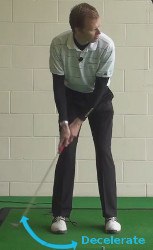
Decelerate in Golf
Golf is a sport that requires practice, skill, and precision. One important concept to understand is the term “decelerate.” In golf, deceleration refers to the act of slowing down the clubhead speed as it approaches impact with the golf ball. Effectively controlling deceleration is crucial for consistent and accurate shots. Let's dive deeper into this concept!
Here are a few key points to understand about deceleration in golf:
- Deceleration is the opposite of acceleration; it involves reducing speed rather than increasing it.
- When a golfer decelerates during their swing, it can lead to a loss of power, control, and accuracy.
- Deceleration often occurs when golfers try to guide the ball instead of committing fully to their swing.
- Common causes of deceleration include lack of confidence, fear of mishitting the ball, and attempting to control the shot too much.
- Proper weight transfer and maintaining a smooth, rhythmic swing tempo are essential for avoiding deceleration.
Understanding the consequences of deceleration can help golfers address and correct this issue. Here's why it's important to avoid deceleration:
- Loss of Power: When you decelerate your swing, the clubhead loses its momentum, resulting in reduced power. This can lead to shorter shots and difficulty in reaching the desired distance.
- Inconsistent Contact: Decelerating during the downswing can cause the golfer to strike the ball with the clubface in an unintentional manner. This can result in off-center hits, which affect distance and accuracy.
- Inaccurate Shots: A decelerating swing can cause inconsistency in clubhead speed, leading to a lack of control over direction and accuracy. It becomes challenging to predict where the ball will go.
To avoid deceleration and promote a more effective golf swing, try implementing these tips:
- Maintain a smooth rhythm: Focus on maintaining a consistent tempo throughout your swing. This helps ensure a fluid and continuous motion, reducing the chances of deceleration.
- Visualize the full swing: Instead of trying to guide or manipulate the ball, visualize a complete swing from beginning to end. This helps promote a full release of the clubhead and prevents deceleration.
- Trust your practice: Have confidence in your abilities and trust the practice you've put into perfecting your swing. Confidence helps eliminate the fear of mishitting and encourages a committed swing.
- Focus on weight transfer: Proper weight transfer from backswing to downswing is essential for generating power and avoiding deceleration. Shift your weight smoothly and purposefully.
- Stay relaxed: Excessive tension in your muscles can lead to a rigid swing and potential deceleration. Focus on staying relaxed and maintaining a loose grip on the club throughout your swing.
Remember, consistent practice and awareness are key to overcoming deceleration in golf. By maintaining a smooth tempo, visualizing your swing, trusting your abilities, concentrating on weight transfer, and staying relaxed, you can minimize deceleration and improve your overall performance on the golf course!





